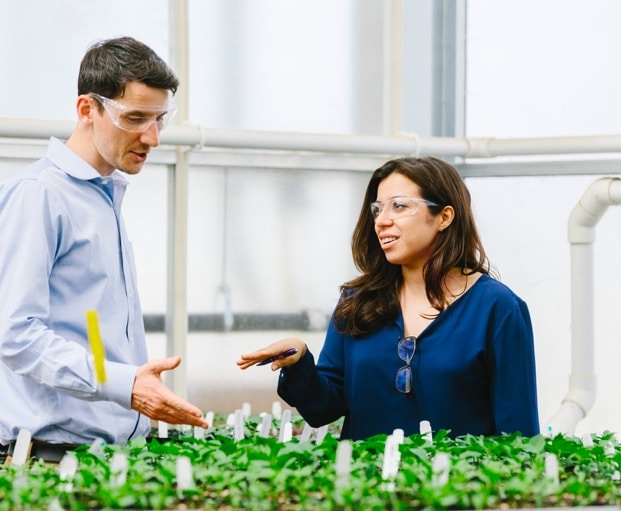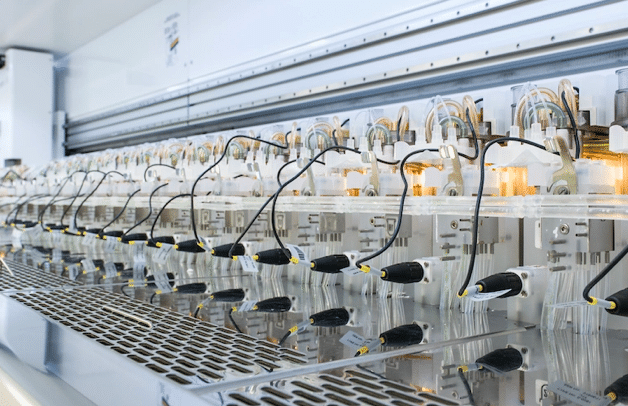Ginkgo Bioworks gets buy-equivalent rating from Raymond James

The opportunity is only getting sweeter for bioengineering company Ginkgo Bioworks (Ginkgo Bioworks Stock Quote, Charts, News, Analysts, Financials NYSE:DNA), according to Raymond James analyst Rahul Sarugaser, who commented on Ginkgo’s latest moves in a research report on Wednesday. Sarugaser maintained an “Outperform 2” rating on the stock, saying Ginkgo’s new collaboration with pharma giant Merck lends further credibility to the company’s biosynthesis technology.
Boston-based Ginkgo, which designs and builds bespoke living cells using its Foundry + Codebase platform, announced on Tuesday a collaboration with Merck to develop up to four enzymes and their accompanying expression strains for use as biocatalysts in pharmaceutical manufacturing. Under the terms of the deal, Ginkgo will earn an undisclosed upfront R&D fee and will be eligible to receive success-based R&D milestone payments (amounts undisclosed) along with commercial milestones of up to $144 million in total. Ginkgo said the R&D for the projects is expected to be completed in 12 to 18 months before Merck can go ahead with commercial use.
“Merck is a pioneer in biocatalysis, improving manufacturing of crucial medicines. We’re thrilled to be partnering with Merck and to be leveraging our platform capabilities for improved enzyme activity and production” said Jason Kelly, co-founder and CEO of Ginkgo, in a press release.
“Ginkgo’s platform model enables us to identify improved enzymes and develop powerful fungal strains and fermentation processes for enzyme manufacturing, empowering downstream API production for our customers,” he said.
Commenting on the announcement, Sarugaser said Ginkgo’s biopharma portfolio is growing increasingly impressive. The analyst pointed to other 2022 announcements in collaborations with Novo Nordisk, Selecta Biosciences, Synlogic, Microba Life Sciences, Elanco and Persephone Biosciences, which go along with pre-existing collaborations with Biogen, Moderna, Aldevron, Roche, SapioniQx, Totient, Antheia, Optimvia and Tantu.
“While we believe synthetic biology’s impact will be made in nearly every corner of the world of material goods—and Ginkgo’s customer set is correspondingly broad—Ginkgo has publicly expressed its aim to more deeply penetrate the high-margin, high-value world of biopharma (and biopharma manufacturing). We believe that a solid initial customer set and, more importantly, excellent customer outcomes, beget a strong biopharma portfolio,” Sarugaser wrote.
Not only Ginkgo’s partnerships but its results have been positive. Sarugaser noted that Aldevron announced last year that Ginkgo materially improved the efficiency of its VCE production process used in mRNA vaccines, while in August of this year, Synlogic announced the nomination of a Ginkgo-engineered Synthetic Biotic drug candidate for the treatment of gout.
“While we wait for said revenue to precipitate, however, Ginkgo’s last two deals in the space—Merck and Novo Nordisk—should endow the company with top-tier credibility,” Sarugaser wrote.
Sarugaser argued that Merck is a biocatalysis pro, and in choosing Ginkgo as a partner, it signals Ginkgo’s “growing prowess and competitiveness in this space.”
“We believe Ginkgo’s success engineering these initial four enzymes could lead to Merck (and its peers) becoming a meaningful source of deal-flow in the future, as we saw in Merck’s relationship with Codexis,” he said.
Sarugaser also spoke positively about Ginkgo’s recent tuck-in acquisitions, including biotech company Circularis, announced last week, saying that the acquisition has made Ginkgo’s offering more competitive in the bioproduction, RNA therapeutics and cell and gene therapy space.
“Ginkgo will probably accelerate its cell program additions in these areas during the next 12 months,” Sarugaser wrote. “We see Ginkgo’s acquisition of Altar last week—adding automated adaptive laboratory evolution capabilities to its Foundry repertoire—as key investment made toward its important pursuit of Knight’s law: consistent exponential increases in Foundry output (e.g. strain tests) in concert with exponential decreases in operational costs per unit output. During the last 5 years, Ginkgo has increased output ~3x/year in concert with a ~50 per cent reduction in unit cost per year.”
On Ginkgo’s financials, Sarugaser is expecting the company to generate $442 million in revenue in 2022 compared to $314 million in 2021 and moving to $393 million in 2023. On EBITDA, he is estimating Ginkgo to go from negative $106 million in 2021 to negative $228 million in 2022 to negative $375 million in 2023. The company’s EV/Revenue multiple is expected to go from 15.3x for 2021 to 10.8x for 2022 and to 12.2x for 2023. EV/EBITDA is pegged at negative 45.1x for 2021, negative 21.0x for 2022 and negative 12.8x for 2023.


